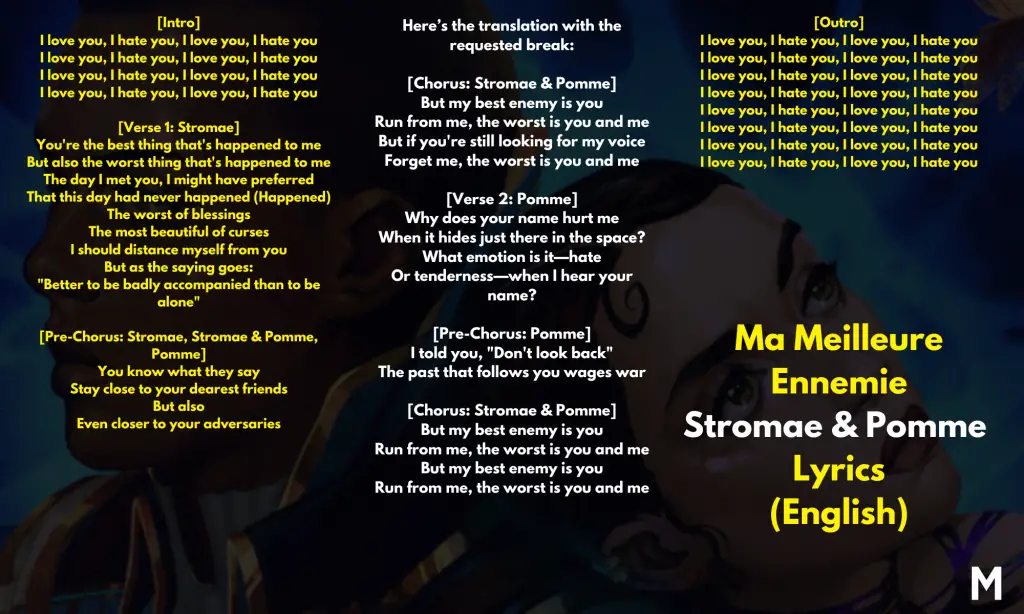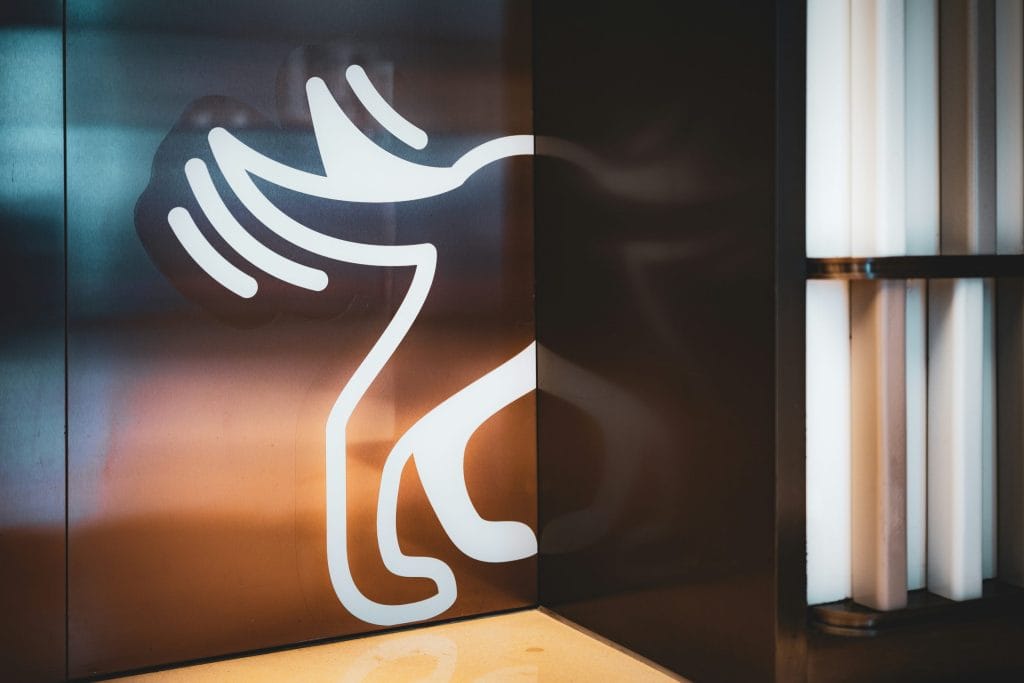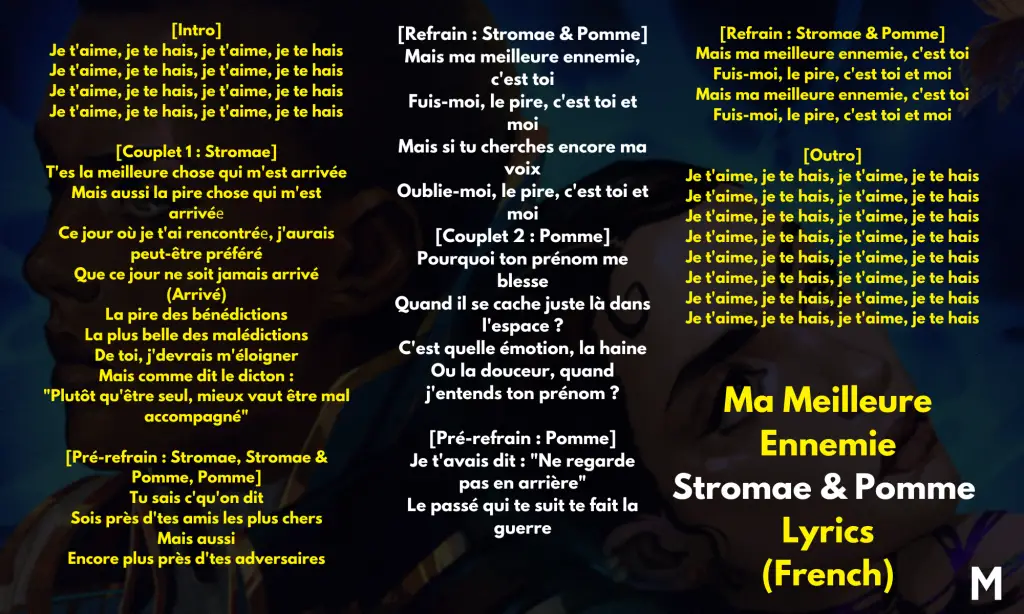Table of Contents
Image C/O Riot Games
Stromae and Pomme’s “Ma Meilleure Ennemie”, at first glance, is a hauntingly beautiful track about a toxic relationship, but when you lean into the lyrics, it starts to reveal something deeper about the way love and hate can become impossible to untangle. For me, with my background in English literature and creative writing, this song is a perfect excuse to stretch some literary muscles and ask, “What can stories, poetry, and even modern fantasy teach us about the emotional tug-of-war this song captures?”
The fact that this track exploded alongside its appearance in Netflix’s Arcane only adds another layer. The song doesn’t just stand on its own—it’s tied to the story of Ekko and Jinx, a pair of characters locked in their own love-hate dynamic.
Whether you’re here because the song caught your ear, the show hooked your heart, or you’re just trying to figure out why this all feels so timeless, my hope is that we can pull these threads together. Let’s dig into the lyrics and see what they—and maybe a few classic literary ideas—have to tell us about the ways love can be both the thing that saves you and the thing that breaks you.
“Ma Meilleure Ennemie” at a Glance
- Love and hate aren’t opposites: The lyrics reveal how these emotions can coexist, shaping relationships that are both magnetic and destructive.
- The past is alive in the present: Through vivid details like the sound of a name, the song shows how memory holds onto us and keeps the pain close.
- Some cycles can’t be broken: The song’s repetition reflects the inescapable nature of emotional loops—where love and hate feed into one another endlessly.
Stromae & Pomme – Ma Meilleure Ennemie Lyrics

Ma Meilleure Ennemie Meaning
“Je t’aime, je te hais” (I love you, I hate you)
The song begins with a repeating refrain: “Je t’aime, je te hais.” These words feel simple, but they carry so much weight. Love and hate are two powerful emotions, and the way Stromae and Pomme repeat them over and over makes it clear that these feelings are tightly connected. It’s not about choosing one or the other—they both exist at the same time.
This reminds me of something Alfred de Musset explores in his poem “La Nuit de Mai” when he writes, “Poets only sing well of what has hurt them.” The repetition here isn’t just about the relationship—it’s about the pain of being stuck in these feelings. Stromae and Pomme aren’t just describing emotions; they’re showing us how hard it is to escape them.
By using these four words—“Je t’aime, je te hais”—over and over, the song feels like a loop, just like the emotions they describe. It’s like they’re saying this cycle will never end. And isn’t that true for so many of us? When someone has a deep hold on your heart, it’s hard to let them go, even when you know they hurt you.
“T’es la meilleure chose qui m’est arrivée, mais aussi la pire” (You’re the best thing that’s happened to me, but also the worst)
In the first verse, Stromae describes the person he’s singing to as both the best and worst thing in his life. He even calls them “La pire des bénédictions, la plus belle des malédictions” (The worst blessing, the most beautiful curse). These lines capture how relationships can be both amazing and painful at the same time. It’s not one or the other—it’s both, all mixed together.
This idea of love as a double-edged sword is something we also see in Musset’s poetry. In “La Nuit de Mai,” he writes, “A bitter drink from a golden cup.” That’s the same idea Stromae is singing about. Love can feel like a beautiful gift, but it can also bring so much hurt. The contradiction is what makes it so powerful.
Stromae even quotes a proverb: “Plutôt qu’être seul, mieux vaut être mal accompagné” (Better to be badly accompanied than alone). It’s heartbreaking because he knows the relationship isn’t good for him, but being with this person still feels better than being alone. It’s a kind of emotional trap—one that so many people can relate to.
“Sois près d’tes amis les plus chers, mais aussi encore plus près d’tes adversaires” (Keep your close friends close, and your enemies even closer)
The pre-chorus brings in the idea that love and conflict go hand in hand. Stromae’s use of the word “adversaires” (adversaries) shows how love can sometimes feel like a battle. The person you love most can also be the person who challenges you the most.
This reminds me of Paul Éluard’s line in “L’Amour, La Poésie” where he says, “There is no love without torment.” It’s not just about the good parts of love—it’s about the struggles, too. Stromae and Pomme understand this and show it in the way they sing about being close to someone who also feels like an enemy.
When you think about it, the line makes perfect sense. In love, we open ourselves up to vulnerability. That closeness can make us feel amazing, but it can also make us feel hurt. The idea of keeping “your enemies closer” isn’t just about strategy—it’s about how deeply connected we are to the people we love, even when they hurt us.
“Pourquoi ton prénom me blesse?” (Why does your name hurt me?)
In the second verse, Pomme takes over with a question: “Pourquoi ton prénom me blesse?” (Why does your name hurt me?). This line is so striking because it’s not about what the person is doing—it’s just their name. A name shouldn’t hurt, but it carries all the memories, emotions, and heartbreak connected to that person.
Charlotte Mew captures this same idea in her poem “A Quoi Bon Dire” when she writes, “Though the world may forget you, I remember you still.” Like in the song, Mew shows how love can linger, even when we try to move on. Pomme’s question about the name is her way of saying that even the smallest reminder of this person brings everything rushing back.
This line also feels universal. We’ve all had moments when a song, a place, or even a name brings back memories we weren’t ready to face. It’s a reminder that the past is always with us, whether we want it to be or not.
“Le passé qui te suit te fait la guerre” (The past that follows you wages war)
Pomme adds another layer of complexity in the pre-chorus: “Le passé qui te suit te fait la guerre” (The past that follows you wages war). Here, the past isn’t just a memory—it’s something active, something that fights against you. The idea of the past as a kind of battlefield is so vivid and emotional.
Paul Éluard captures this idea in “L’Amour, La Poésie” when he writes, “Love has the power to destroy as much as it heals.” Like Éluard, Stromae and Pomme show that the past doesn’t just sit quietly—it shapes how we feel and who we are. The memories of love and pain keep coming back, and they don’t let us move on easily.
This line also ties back to the theme of the song: the idea that love and hate are connected. The past isn’t just about the good times or the bad times—it’s both, and that’s what makes it so hard to deal with.
“Je t’aime, je te hais” (I love you, I hate you)
The song ends the same way it begins: “Je t’aime, je te hais” repeated over and over again. This repetition drives home the idea that these emotions don’t have a clear ending. Love and hate are stuck together, and they keep looping back around.
Alfred de Musset sums this up perfectly in “La Nuit de Mai” when he says, “Pain is the eternal companion of love.” Stromae and Pomme show us that love doesn’t just fade away—it stays, tangled up with all the other feelings we have. The ending of the song doesn’t resolve anything, and that’s the point.
This unresolved loop is what makes the song feel so real. It’s not just about the highs and lows of love—it’s about how those feelings stay with us, shaping who we are and how we see the world.
My Favorite Takeaways
One of the biggest ideas in “Ma Meilleure Ennemie” is how love and hate can live side by side. Stromae puts it bluntly in the first verse: “T’es la meilleure chose qui m’est arrivée, mais aussi la pire” (You’re the best thing that’s happened to me, but also the worst). That line hits because it’s honest—so many relationships are complicated in this exact way. It’s a paradox that’s been explored forever in art and writing. Alfred de Musset captures the same idea in “La Nuit de Mai” when he calls love “A bitter drink from a golden cup.”
Both the poem and the song show how love isn’t just beautiful—it can hurt just as much as it heals. That tension is what makes it so unforgettable.
Memory plays a key role here too, especially in Pomme’s verse. When she sings, “Pourquoi ton prénom me blesse?” (Why does your name hurt me?), it’s about more than just the name. It’s everything tied to it: the memories, the emotions, and the weight of what’s left unresolved. This reminds me of Charlotte Mew’s line in “A Quoi Bon Dire”: “Though the world may forget you, I remember you still.” Both the poem and the song deal with how the past stays with us, whether we want it to or not.
It’s a kind of emotional haunting—where even something as small as a name can pull you right back into feelings you thought you’d moved past.
And then there’s the repetition: “Je t’aime, je te hais” (I love you, I hate you). This refrain doesn’t just highlight the cycle of emotions; it locks us into it. The song ends the way it begins, which drives home the idea that some emotional loops are impossible to break. Paul Éluard touches on this in “L’Amour, La Poésie” when he says, “There is no love without torment.” Both the song and the poem lean into the truth that love and hate aren’t opposites—they’re two sides of the same coin.
And sometimes, no matter how much pain is involved, you can’t step out of the loop because it’s tied to something too important to let go of.
The post Stromae & Pomme – Ma Meilleure Ennemie Lyrics and Meaning: Love, Memory, and Pain in Focus appeared first on Magnetic Magazine.






